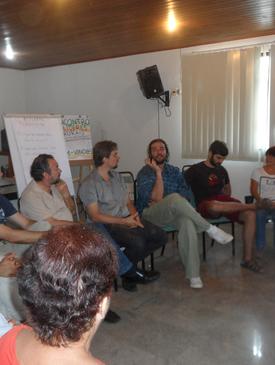“Encontro de Líderes Rurais” - Rural leaders encounters
Summary
Rural leaders and entrepreneurs of Southern Bahia came together to discuss strategies for developing the local economy in a manner that is more closely associated with ecosystem conservation via cacao and chocolate production. Southern Bahia was once the largest cacao-producing region in the world. However, the industry now only produces about half of what it had averaged in the past due to an agricultural disease that destroyed many crops and severely impacted the local economy.
The region’s predominant agricultural system - known as Cabruca - is considered to be a biodiversity friendly approach to cacao production. In fact, this agroforestry system is responsible for the conservation of many centennial trees of the Atlantic Forest. In this system, cacao is produced under the shade of native canopy trees. The region is also home of one of the most diverse forests in the world and is the habitat for several endangered species of wildlife.
Although the region’s historical identity is very connected to cacao production, chocolate production initiatives are very recent. In this event, rural leaders discussed these initiatives in order to determine how best to incorporate and communicate the region’s social, cultural, historical and environmental values into their products.
Content
During four different workshops, facilitators promoted dialogue between the rural leaders of Southern Bahia regarding sustainability concepts related to cacao and chocolate production. They did so by exploring relevant case studies and by unraveling the complexity behind the Cabruca system and its links to emerging ‘green’ food markets. They also discussed appropriate marketing strategies and identified synergistic opportunities. In each workshop, the facilitators made inspiring presentations to guide the dialogue and participants were encouraged to reflect on how the presentation relates to their activities and projects.
Meeting 1
In the first meeting, Rui Rocha, the Executive Director of Instituto Floresta Viva, presented the historical and current socioeconomic context of Southern Bahia. The participants were encouraged to reflect on and discuss how their role as leaders in the region affects the local economy and the environment.
Meeting 2
During the second meeting, Mario Mantovani from SOS Mata Atlantica presented the history of Brazil’s environmental movement. The second talk was lead by Diego Badaró, owner of Amma Chocolates and a pioneer in organic, high quality chocolate production in Bahia.
Meeting 3
During the third meeting, Rogerio Quintella from the Federal University of Southern Bahia opened the workshop by presenting the region’s industrial evolution and the university’s plans to implement an industrial park in Ilhéus. Pedro Leitão then presented about the B-Team initiative, which is a group of executives that are re-shaping their businesses by incorporating and reducing social and environmental externalities in their products. Renata Paioli also presented two successful branding cases that were able to positively market their geographic region in their products.
Meeting 4
During the final meeting, participants were encouraged to present their future projects and discuss them with the other participants. Additionally, the participants contributed to the rebuilding of a historic train station into a restaurant and museum.


